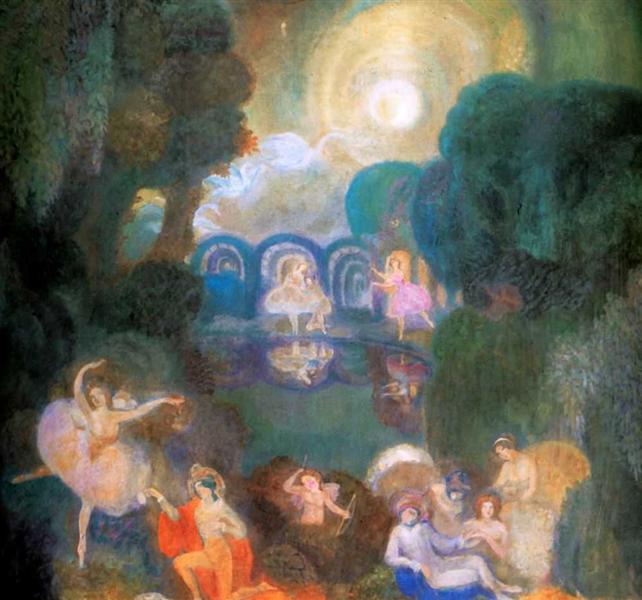Description
In the work "Ballet - 1910" by Serge Sudeikin, a vibrant dialogue between movement and aesthetics is displayed, conjuring the essence of ballet through a rich palette and a carefully designed composition. Sudeikin, known for his role as a set designer, as well as his ability as a painter, captures in this piece the dynamic spirit of dance, evoking an atmosphere of elegance and sophistication of the time.
The painting presents a scene in which stylized figures move in a space that seems to flow with an almost palpable energy. The characters, vaguely delineated, are organized in such a way that they evoke the sensation of an ongoing dance. Although their faces are barely suggested, the disposition of their bodies transmits an emotional narrative, revealing the tension and grace that characterize ballet. This approach in the form of detail allows painting to work as a symbol of music and movement, leading the viewer to feel the rhythm of the show.
The use of color in "Ballet - 1910" is particularly notable. Sudeikin resorts to a range of warm and cold tones that contrast and complement each other, creating an enveloping and almost dreamlike atmosphere. The nuances of blue and gold provide a sense of depth and visual wealth, while the rosy nuances suggest the fragility and beauty of the dancers. This colorful approach not only enhances the visual narrative of the work, but also reflects the influence of symbolism, a style that prepared in the art of the early twentieth century.
The composition is marked by a structure that guides the viewer's gaze, from the figures centered to the edges, suggesting a scenario that is in constant movement. This dynamism is characteristic of Sudeikin's work, who, influenced by Fauvism and post -impressionism, manages to merge figurative representation with a sense of emotional expressiveness. The canvas structure invites an intimate reading of the ballet experience, emphasizing the contrast between the stiffness of the technique and freedom of art.
It is important to contextualize Sudeikin within the artistic movement of his time. Born in 1882 in Russia, his career was marked by his relationship with the world of theater and opera, which significantly influenced his pictorial approach. When exploring ballet, Sudeikin not only captured the essence of dance, but also addressed related themes, such as the aesthetics of movement and intersection between various art forms. His work, therefore, is inserted in a broader dialogue about art and performance, making "ballet - 1910" a reflection on art in its entirety.
In conclusion, "Ballet - 1910" is a work that encapsulates Serge Sudeikin's mastery in the representation of movement and emotion through color and shape. Painting is not only a tribute to ballet as art, but also a testimony of Sudeikin innovative talent, who sailed between different disciplines to create a lasting legacy. The visual and emotional wealth of this work invites the spectator to immerse himself in the ballet world, celebrating his beauty and complexity.
KUADROS ©, a famous paint on your wall.
Hand-made oil painting reproductions, with the quality of professional artists and the distinctive seal of KUADROS ©.
Art reproduction service with satisfaction guarantee. If you are not completely satisfied with the replica of your painting, we refund your money 100%.

